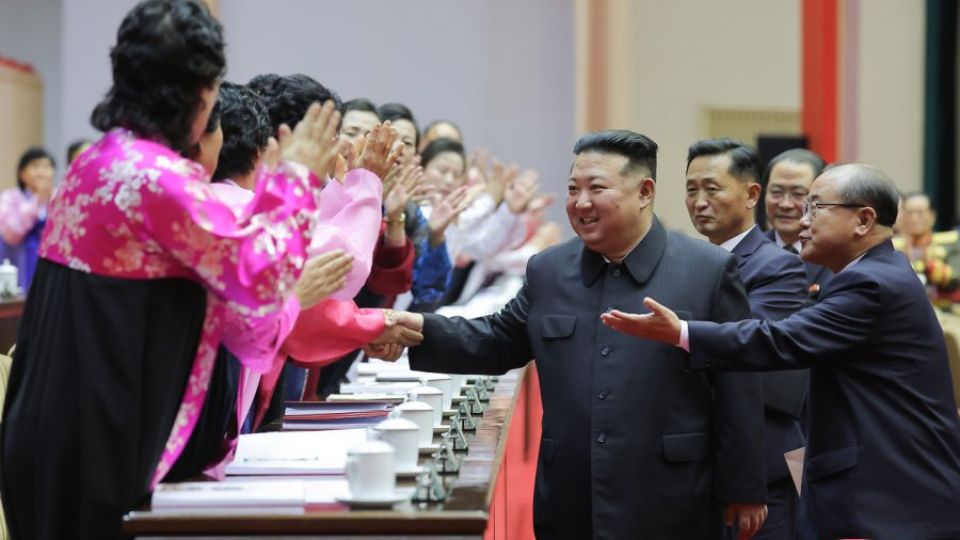December 7, 2023
SEOUL – North Korea orchestrated a unique event on Tuesday, where personally curated gifts from leader Kim Jong-un were presented to participants at the national mothers’ meeting, continuing the trend of promoting the pivotal role of mothers in state-controlled media.
North Korea hosted the fifth National Conference of Mothers in Pyongyang on Sunday and Monday, marking the first occurrence of the event since 2012.
Speaking at the event, Ri Il-hwan, the secretary of the Central Committee of the Workers’ Party of Korea, underscored that North Korean leader Kim Jong-un had “personally guided the selection of items and the number of gifts, taking into consideration the fact that the participants are daughters-in-law, wives, and mothers of families.”
Kim also directed that this preparation be an initiative of the party central committee, highlighting its significance, Ri said.
Since North Korea initially convened a national mothers’ meeting in November 1961, subsequent meetings were held in 1998, 2005 and 2012. Kim Jong-un participated in a group photograph session during the fourth meeting.
However, South Korea’s Unification Ministry and experts in Seoul have noted that the fifth event carries another level of significance.
“Given that Chairman Kim Jong-un delivered both the opening speech and the closing speech, it underscores the importance attributed by him to the event,” a senior Unification Ministry official said Tuesday during a closed-door briefing.
The occasion marked the first time a North Korean leader has addressed the national mothers’ meeting since 1961, when the country’s founder Kim Il-sung delivered a speech. Then-leader Kim Jong-il was absent at the second and third meetings.
On the first day of the event, Kim was seen visibly shedding tears while listening to a party report from Ri in a video aired by the state-run Korean Central Television on Monday.
In his opening speech, Kim addressed the issue of decreasing birth rates, marking the first time he has publicly discussed the matter since assuming power in 2011.
“Preventing declining birth rates and ensuring quality child care and education are matters that concern every household, and addressing these issues requires collaborative efforts with mothers,” Kim said.
South Korea’s Unification Ministry said Kim’s speech indicates that North Korea is also coping with the challenges posed by low birth rates.
In a report released this August, the Hyundai Research Institute in Seoul said North Korea’s population is anticipated to decrease beginning in 2034. The downward trend is expected to intensify, with a projected population of 23.75 million by 2070 from 25.97 million in 2021.
However, Lim Eul-chul, a professor of North Korean studies at Kyungnam University in Seoul, said the meeting had multiple objectives.
In the meeting, Kim Jong-un underscored the vital role of mothers in instilling communist and socialist ideologies in their children, emphasizing the importance of this indoctrination for the maintenance of regime stability in both his opening and closing speeches.
“Our mothers shoulder the weighty responsibility of nurturing their children as pillars for the construction of socialism and communism, shaping them into protagonists of our future society,” he said during his closing speech.
Lim explained that North Korea aims to showcase its dedication to inheriting the tradition of founder Kim Il-sung by emphasizing its focus on 7 million women, particularly mothers.
“The objective is not only to instill absolute loyalty from the people but also to stabilize the socialist regime, tackle the challenge of low birth rates, nurture the next generation, legitimize nuclear and missile development, and foster a conducive atmosphere for leadership succession,” Lim said.
Lim also highlighted that the proactive promotion of women may be linked to a covert objective, possibly related to preparations for the hereditary succession of Kim Ju-ae, the daughter of Kim Jong-un.
“While drawing definitive conclusions is premature, there may be an underlying intention to drive a significant socialist reform that accentuates the role of women in laying the groundwork for the succession of Kim Ju-ae, representing the future generation,” Lim said. “This initiative involves not only highlighting the pivotal role of women, but also fostering a social atmosphere that champions and respects their contributions.”
The ministry also noted the potential connection between Ju-ae and the event, but emphasized that it is too early to make any conclusions.
Yang Moo-jin, a professor at the University of North Korean Studies in Seoul, also highlighted that Kim’s expressions about finding solace in the thoughts of mothers during hardships could be intricately linked to the idolization of Ju-ae.
Promoting respect for mothers nationwide could be an initial step to establish the legitimacy of Ju-ae’s rule within a patriarchal society.
Kim has been burdened by the fact that, as the offspring of a concubine himself, it makes it difficult to secure legitimacy for Ju-ae.
“In a challenging context, there might be an underlying intention to emphasize respect and patriotism toward mothers in general, aiming to establish the integrity of the bloodline in the succession process,” Yang said.
“On the other hand, we cannot dismiss the possibility that Kim is aiming to emulate the image of a leader of a normal state by addressing women’s issues.”


